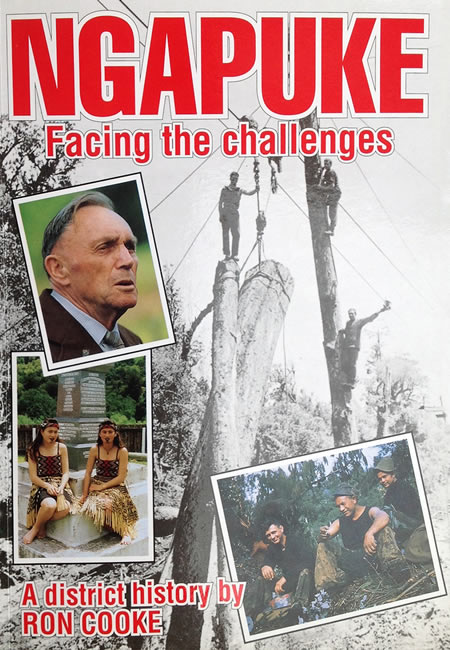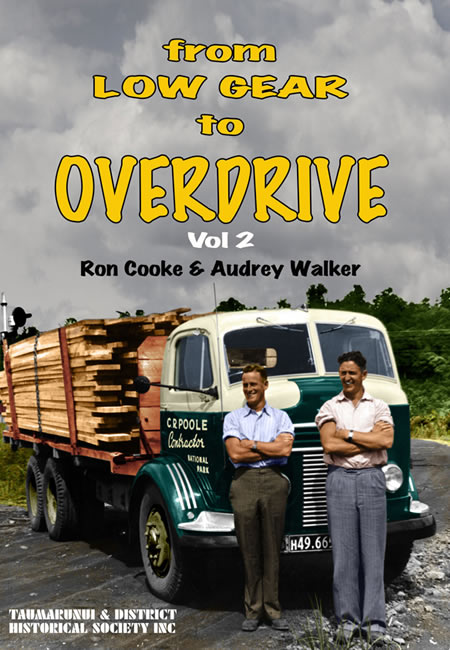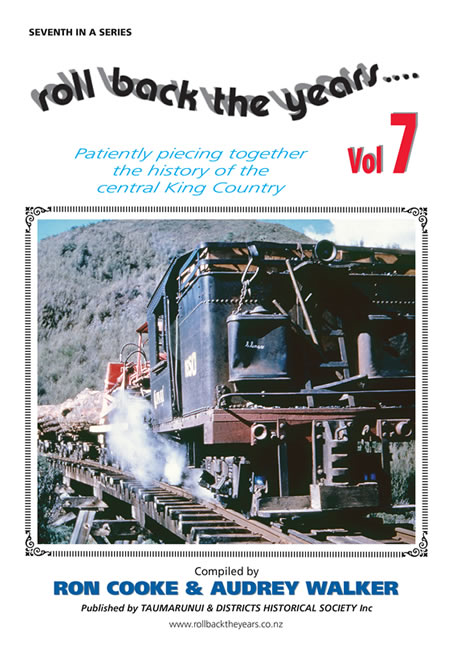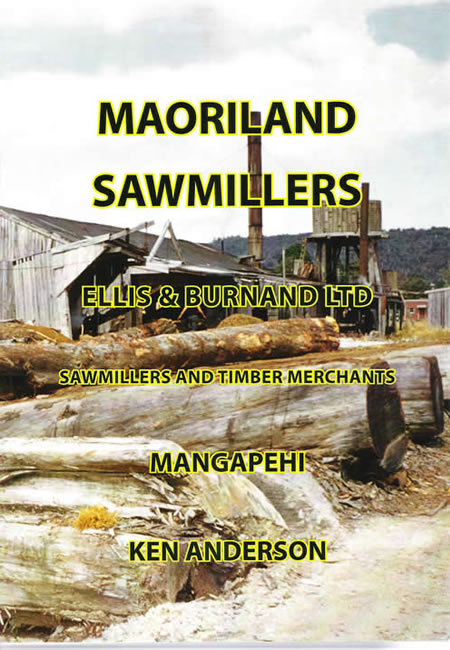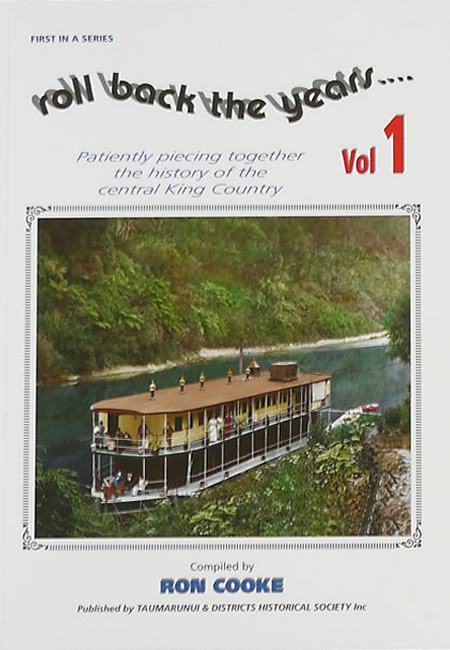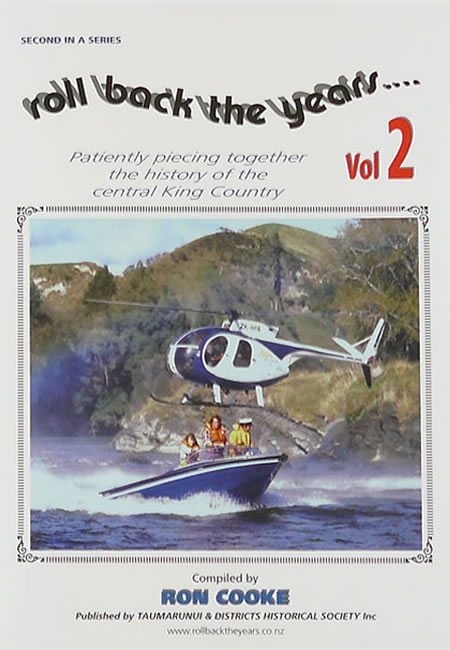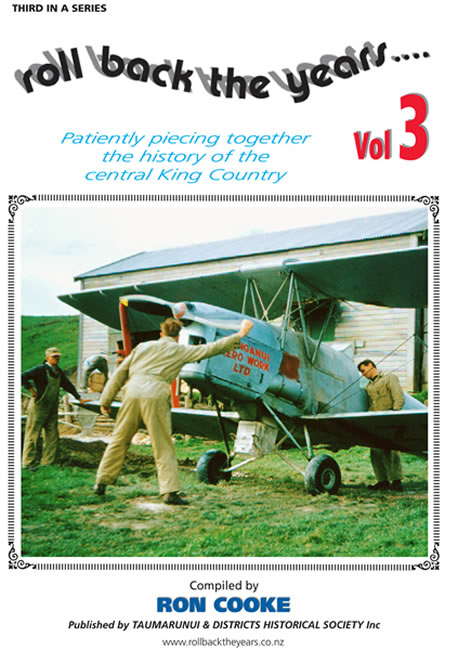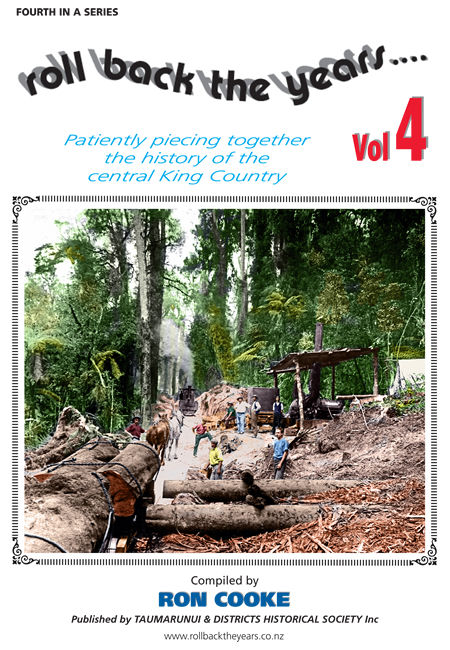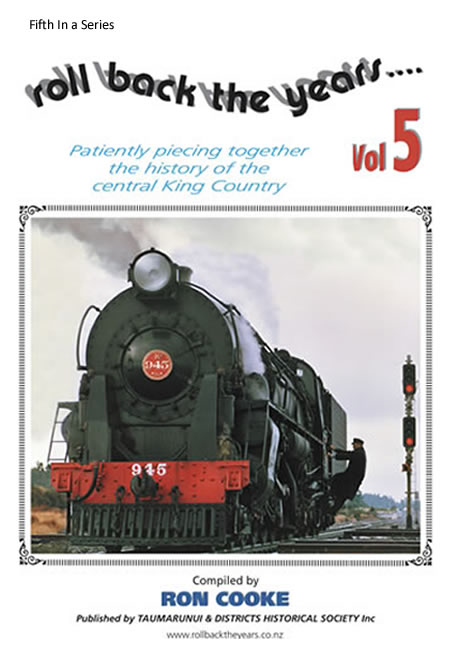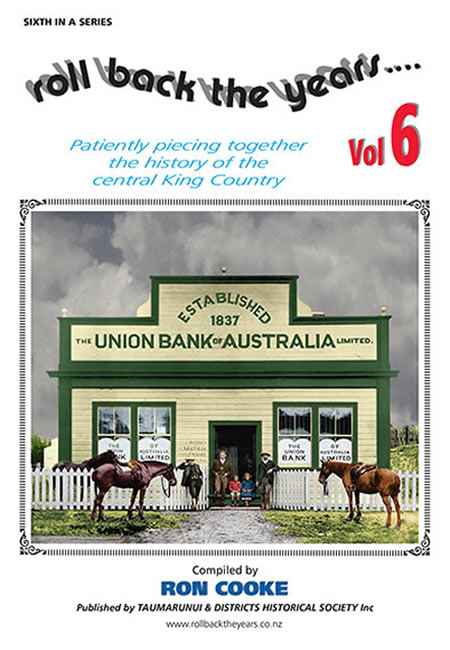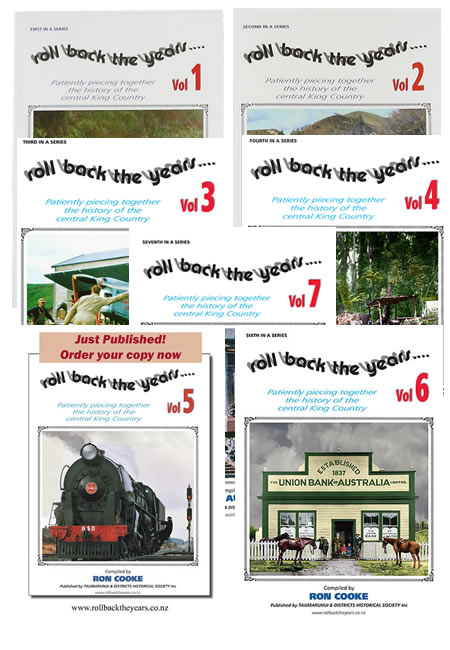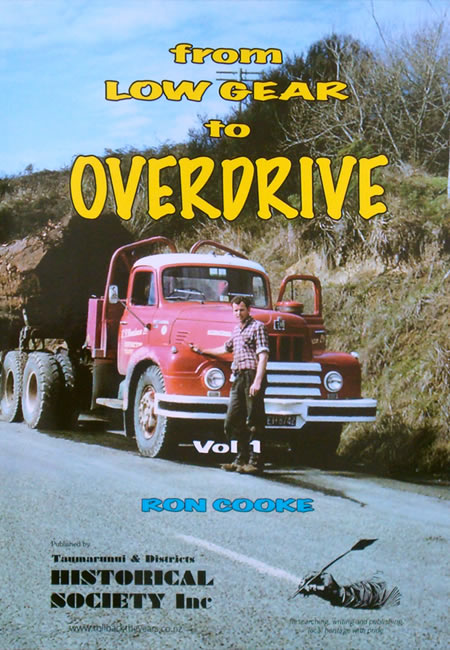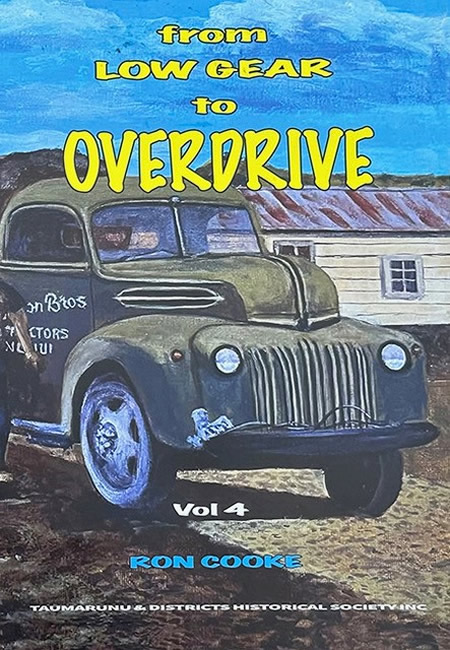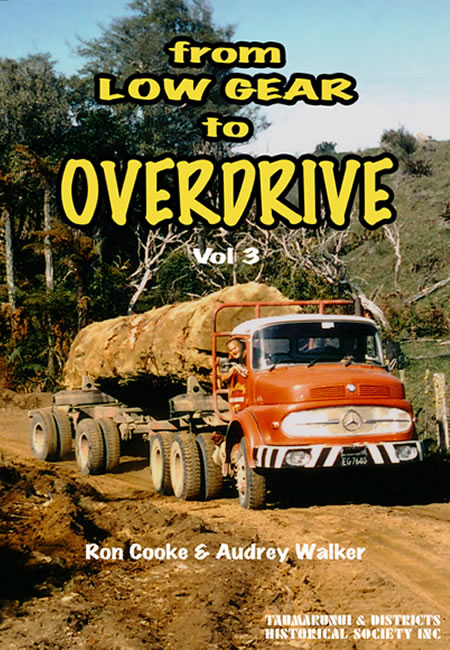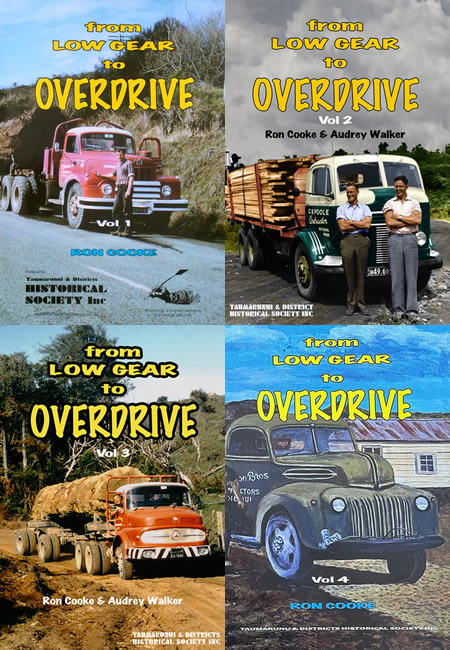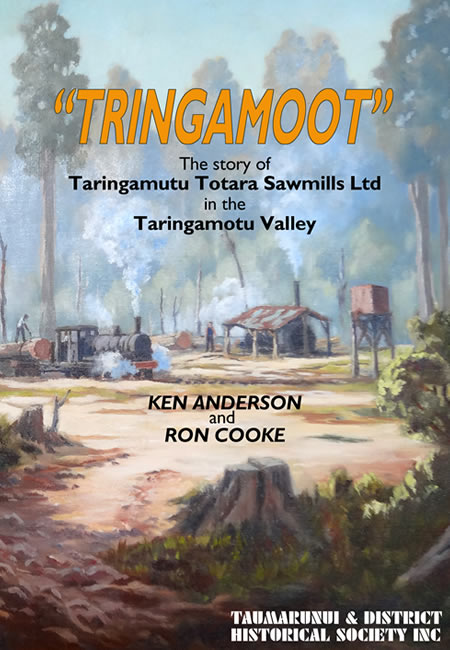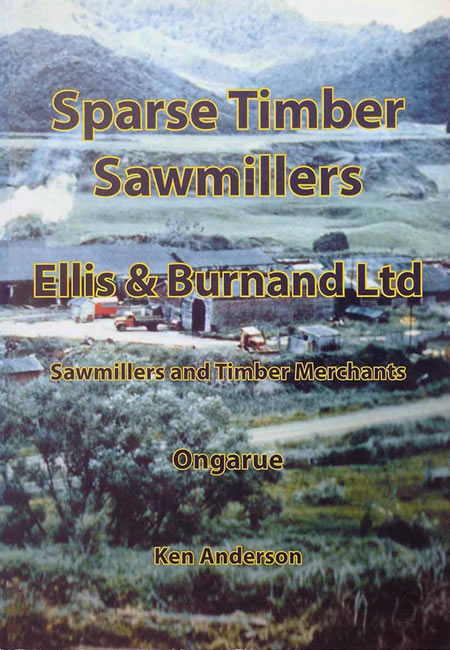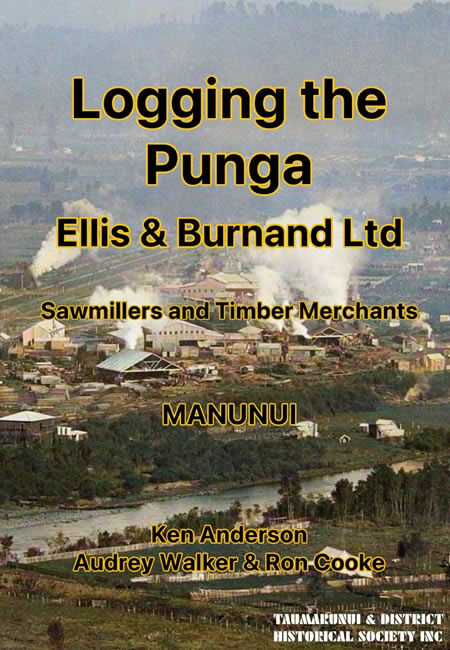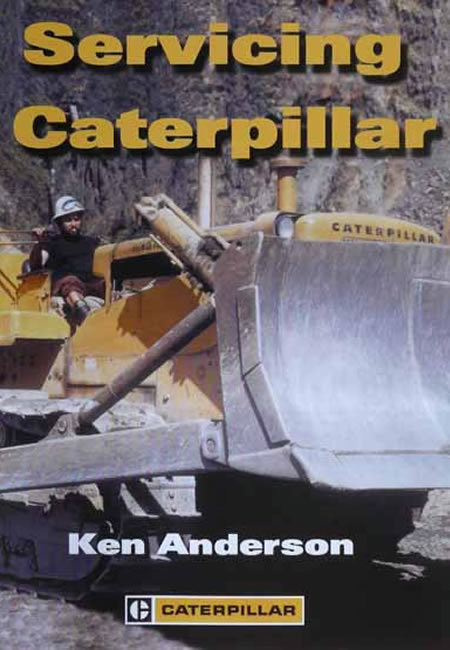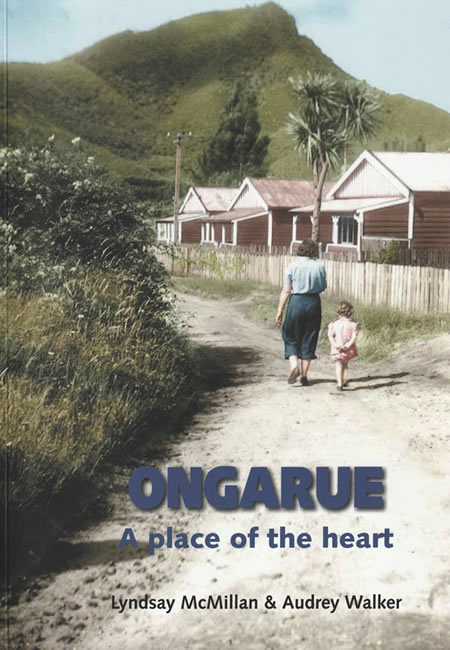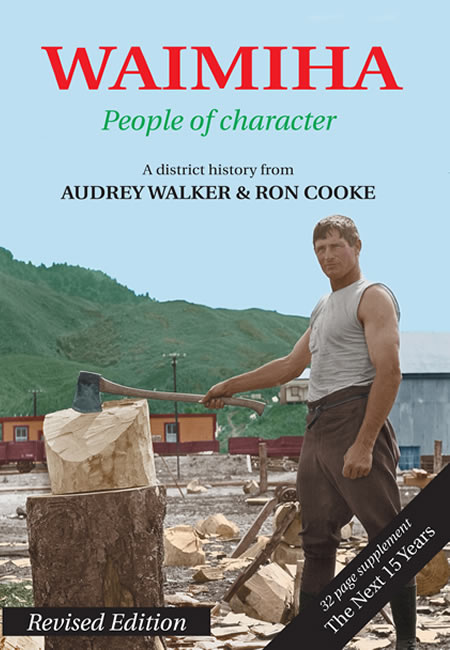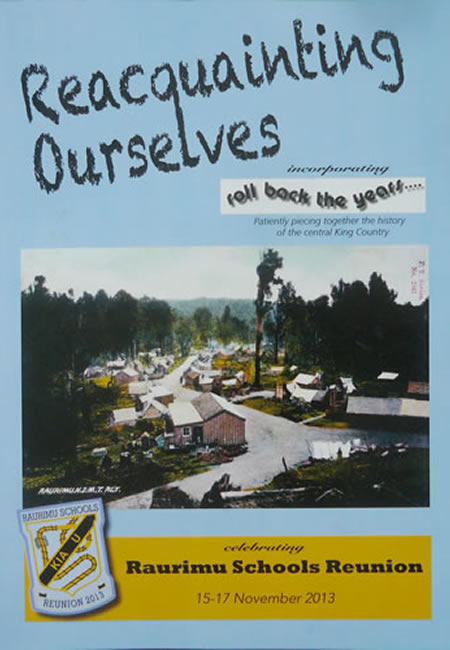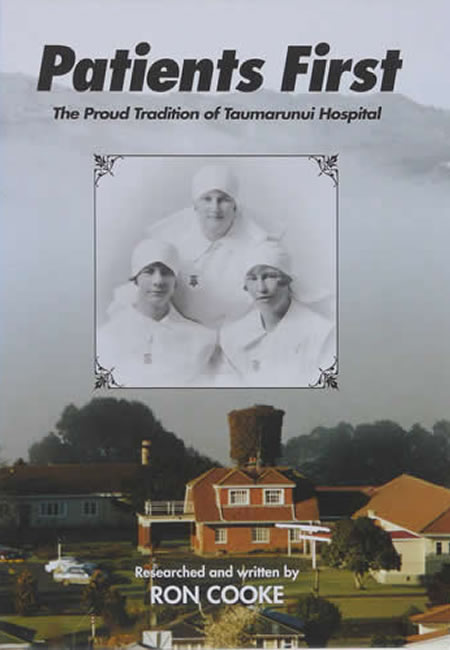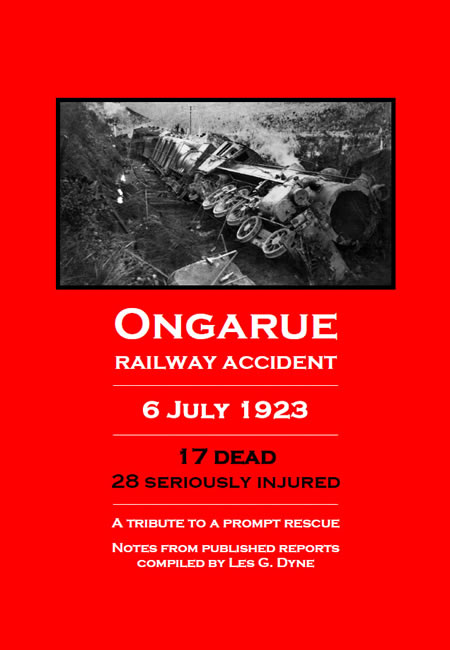-
There are plenty of copies still available of Volume 1 and our promise is to never let them become unavailable. Its the old photographs that make the pages interesting and by giving life to the written word, readers will be amazed at what our forebears achieved. For instance, unusual loads carried by the old riverboats, the big clock on Fanthorpe's Corner, the secrets of sly grogging, the arrival of the first newspaper, the beginning and end of Meredith House and Domett's Corner. Theres a lot more so click on View Sample below . . . View Sample
-
Vol 2 follows the same format as Vol 1 with short easy-to-read stories with fantastic historic photos of days gone by . . . For example, some of the earliest photos of Taumarunui have come from the camera of Alfred Burton in 1885, the days when the King Country was still a wild and mystical unknown region. Apart from sawmilling, sport, railways and snippets from Manunui, Piriaka, Kakahi and Taumarunui, theres extended coverage on the wilderness area of Tokirima. Take a quick peep at a selection of sample pages by clicking View Sample . . . View Sample
-
Featuring in this volume are extended pictorial coverages of Manunui, Raurimu and the timber industry that coincided with reunions and jubilees held during 1982 and 1983. The leading article is seen through the eyes of various New South Wales bank managers who described life in the raw developing towns of Matiere, Ohura and Taumarunui. The cover features a Tiger Moth being "cranked up" during the early days of topdressing at Te Whakarae along with a spectacular shot of a Wanganui Aero Work Ceres dropping its load of fertiliser at Piriaka. There's a lot more so click on View Sample below . . View Sample
-
Another volume, the 4th in this series, again covers a wide range of subject matter backed up with the usual interesting historic photographs. Readers are reminded, in the compiler's introduction, of the value of old photos and the new lease of life being given using modern technology. A tribute is being paid to all photographers, from all generations, who faithfully recorded the events of their time that we are now sharing and learning from. The extended captions usually tell a different story to the main text and often point out something not seen at first glance. To gain a full appreciation of what is being offered click on View Sample below to find what is being offered from the content pages and other randomly selected pages . . . View Sample
-
Events and jubilees are great for discovering new information and photos. This volume contains some of the results found in Taringamotu Valley (including Ngakonui and Waituhi), Kirikau and Owhango. A few quiet chuckles will be raised about the early exploits of the fire brigade plus the nostalgia of steam locomotives particularly Ka 945 that spent most of its life based at Taumarunui. That's why Ka 945 is featured as the cover girl! View Sample
-
This was supposed to be the last volume completing the original 1980s series and not surprisingly, is equal to the standard of the previous five volumes. This remarkable set will take pride of place on your bookshelf and has proven to provide plenty of nostalgic discussion if left on your coffee table. This volume covers a wide range of subjects with excellent photographs that readers will relate to especially if part of your life has been spent in the central King Country. The Union Bank photo featured on the cover surfaced during the 75 year celebration of Bank of New Zealand in Ohura and there's the romantic beginnings of the famous Bell family descendants of Alexander and Katarina celebrated their centennial in December 1984. Other interesting coverage includes a pictorial history of Hatrick's Houseboat; the nice girls of WWSA; Youthaven and Brethren Church activities; life in Kakahis suburb of Bulltown; Ted Lattey's tough tramp in 1931; amusing antics of Ongarue Rugby Club; tales of early law enforcement including the attempted murder of Constable John Maher. View Sample
-
All new stories. The result of a writing competition held in 2016. More than 20 local contributors with stories and photos covering a wide range of subjects and areas within the district. Continuing in the tradition of the original six volume series which contained the old magazines first published in the 1980s. Buy one or the whole series of Roll Back the Years. This series will become a collectors item in years to come.
-
Buy the full set of 7 Roll Back the Years editions for the reduced price of $240.
-
In the early days trucks were so overloaded and underpowered that they were always in low gear. Now with trucks up to 730 HP they are never in low gear, mostly in overdrive. This is Volume 1 of a two part series, Volume 2 to be published in 2012. It is filled with stories and photographs gathered from the people involved in the transport industry to create a unique record of an important part of the history of the Taumarunui District. View Sample
-
Between his fathers Diamond T and the modern Mitsubishi trucks of his company, Ongarue Transport, the intervening years in the transport industry are summed up by this Woody quote: (Sometimes when we get the odd growl we threaten to get out an old truck like the ones we used to drive, then well see how you go.) This is Volume 2 of a now three part series, Volume 3 to be published in 2014. It is filled with stories and photographs gathered from the people involved in the transport industry to create a unique record of an important part of the history of the Taumarunui District. View Sample
-
The long awaited fourth volume in the trucking history of Taumarunui and surrounding districts. In keeping with the previous three books, Ron Cooke has produced another collection of intriguing insights into the hard working, never let anything beat them attitude of the folk involved in bush work and sawmilling, quarrying, road building, fuel and cement delivery and other aspects of the transport industry in the King Country. A4 sized book, 192 pages with many photos accompanying the text.
-
The third volume in the series of the history of the transport industry in and around Taumarunui. From the early days when trucks were struggling with massive logs and other loads way beyond their specifications up to the powerful big shiny rigs of today. The hard work and camaraderie of the trucking fraternity over the years shines through in the stories and photos they have provided for this fascinating publication. Trucking was at the heart of all aspects of the districts development so the accounts are many and varied. Not available until mid October 2015 Preorders welcome View Sample
-
Buy Volume One, Two, Three and Four of the From Low Gear to Over drive for the combined price of $240 plus postage. All issues available now. Purchase the set as a gift for a friend.
-
A group of enthusiasts began researching the history of Taringamutu Totara Sawmills Ltd in the early 1970s. They collected many stories and photos from people who had worked the bush and mills on the outskirts of Taumarunui. Since then one of their number, the late Ken Anderson, wrote a manuscript which has now been added to and completed by Ron Cooke. The long awaited story of the five mills and extensive tramways of the operation between 1903 and 1971 is now available. View Sample
-
It covers the entire span of the years of bush workings, tramline and mill operation from 1903 until the mill closed in 1966. Kens meticulous research and use of maps and photos produced a much sought after book and his initial print run soon sold out. The fame of the magnificent tramway will soon be rekindled when The Timber Trail, Pureora - Ongarue cycle way and walk way opens, due late 2012. The Department of Conservation has done a splendid job of restoring the tramways spiral and building replica viaducts. This book tells the story of the remarkable feat of the original construction and the timber extraction that followed. Ken first published this comprehensive account of Ellis & Burnands Ongarue sawmilling operation in 2007. Since his death in 2008 his children have entrusted his work to Taumarunui & Districts Historical Society. We are delighted to present this reprint.
-
Ken Anderson's 2008 book on the Mangapehi operations of Ellis & Burnand has been reprinted due to popular demand. The curiosity of Ken was aroused back in 2004 by stories he had heard of a Maori lady who sat on the tramway to disrupt milling operations so he set about to discover more. After much research through official records Ken uncovered a continuing saga of dissatisfaction with E&B by some of the Maori owners of the land. Their biggest gripe was not being adequately paid with royalties. That's only an appetiser as there was much much more of interest that happened over the 68 years that Mangapehi survived the up and down life of the timber industry. View Sample
-
The story of Ellis & Burnands sawmilling operation at Manunui near Taumarunui. For 60 years, from 1901, the Company was a central part of the township that grew up around the sawmills. Over that time hundreds of people worked in the mill, box factory, veneer works, and bush gangs. Ken Anderson wrote the histories of Ellis & Burnands other large King Country mills at Ongarue and Mangapehi, Sparse Timber Sawmillers and Maoriland Sawmillers. He had partially completed the Manunui story before his death and his old mate Ron Cooke, along with Audrey Walker, have completed the job under the auspices of Taumarunui & Districts Historical Society Inc. Ron's influence is apparent in the hundreds of black and white photos of action at the mills, lokeys on the tramways, haulers in the bush, village life and all other aspects covered in the 392 A4 sized paged book. The book begins with profiles of the Company founders, JW Ellis, Harry Burnand and Henry Valder.
-
The story of the Taumarunui branch of Gough Gough & Hamer Ltd through the eyes of retired serviceman, Ken Anderson. Like most tradesmen Ken started his working life in various other locations. In 1951 he served his apprenticeship as a fitter and turner at Wanganui Engineering Works Ltd then a spell with NZ Railways where he was involved with the repair of earthmoving equipment that set him off on his eventual career. He gained certifications in diesel mechanics at Kaingaroa then, in 1962, moved to Taumarunui as Service Foreman for Goughs where he spent ten years. It was during this decade that he began "poking around" the remains of old sawmill sites and machinery used in that industry. The result of this "on-hands" research led him, many years later, to write up the history of Goughs involvement in the King Country with this well-illustrated 200 page book being the only works showing the development of Caterpillar tractors in the area. A must have for every mechanically minded red-blooded male's bookshelf. View Sample
-
First published by Ongarue School Centenary Committee in 2005. The book has been out of print for some years and Taumarunui & Districts Historical Society Inc was granted the go ahead to reprint this treasured, highly illustrated and informative local history. The book holds 448 A4 size pages, perfect bound, all names indexed, and covers all aspects of life in the King Country settlement of Ongarue. Previously known as Kawakawa before the Main Trunk Railway Line was constructed, sawmilling, farm settlement, schooling and other businesses soon followed. Many people called Ongarue home over the ensuing 100 years.
-
First published in 2003 following on from a school reunion, Waimiha People of Character used more than 600 photos, many reminiscing letters and conversations to paint a picture of what life in Waimiha meant to those who made it their home. Maori had harvested the teeming birdlife in the heavily bushclad hills for centuries. With the building of the Main Trunk Railway Line in the early 1900s came the opportunity for farm settlement and sawmilling, 28 sawmill sites have been identified in the valley. Waimiha School flourished with all this activity. We are selling on behalf of Waimiha Sports Club Inc who republished the book in 2018 with the addition of a 32 page supplement to cover the intervening years since first publication
-
A collection of Raurimu articles (previously published in Roll Back the Years) specially compiled as a 52 page souvenir booklet to celebrate Raurimu Schools Reunion 2013. The photographs selected with their extended captions along with short stories will give the reader an excellent idea of what life was like as the town developed. Subject matter covers building of Main Trunk Railway and Spiral; views of township, its businesses and other services plus the devastating fire of 1925. Also included is the school in the early days "under canvas" to the town hall then to purpose built buildings with numerous school groups over the years (pupils all named),the timber industry from horse drawn tramways, steam locomotives and the day a logging truck went through a bridge; and finally to leisure times of two-up, tennis and chopping. View Sample
-
A district history written on the occasion of the 75th Jubilee of Ngapuke School in 1991. The school was established to cater for the children living at Kauriki Marae and the nearby Ngapuke Sawmill. The Pungapunga Sawmilling Company had made an agreement with Ngati Tu Wharetoa to work together to harvest trees on the Puketapu Block. A mill was built at Manunui in 1907 but soon a series of ownership changes got underway as is revealed in the book. Details of the different operators, including Puketapu Sawmills, Patate Timber Co and Pukuweka Sawmills, and other mills in the area are explained through reminiscences, photos and information Ron Cooke found during research. A two-page map of the network of tramways is a valuable record of native logging in the area. The book is a companion to the Taumarunui Historical Society publications Tringamoot and Logging the Punga as Ngapuke linked the two areas where so much bush felling was going on.
-
The Proud Tradition of Taumarunui Hospital. Ron Cooke, the compiler of this 272 page A4 case bound book, says in his introduction that without a doubt, the community was proud of its hospital and it thrived on community support. "It was an institution that united the community they shared in it and cared about it." The controversial marketing strategy that put Taumarunui Hospital on the nation's surgical map is still remembered and talked about. The long drawn out battles with bureaucracy to retain funding, medical staffing and clinical standards was a sad fact of life but Taumarunui met the challenge. This book has over 425 photos and is full of human interest stories with every name mentioned on its pages being included in a comprehensive index. Your name could be here.. View Sample
-
On Friday 6 July 1923 the journey of two hundred passengers aboard the overnight Auckland to Wellington express, Train No.221, ended abruptly when it derailed near Ongarue, 160 miles (257.5 km) south of Auckland and 14 miles (23 km) north of Taumarunui. With 17 deaths and 28 others seriously injured, the derailment was at that time the worst accident to befall New Zealand Railways. About two hundred rescuers from Ongarue, Taumarunui, Te Kuiti, Auckland, and Wellington dealt with the aftermath, among them doctors, nurses, railway workers, and dozens of local residents who provided care and support for the injured and uninjured passengers. The stories in this A4 sized, 112 paged book have been collated from newspaper reports and witness statements presented to the Official Board of Inquiry and is an acknowledgement to all those involved in the rescue effort, and to the railway staff who cleared the wreckage and relaid the track to ensure the swift resumption of train services.

